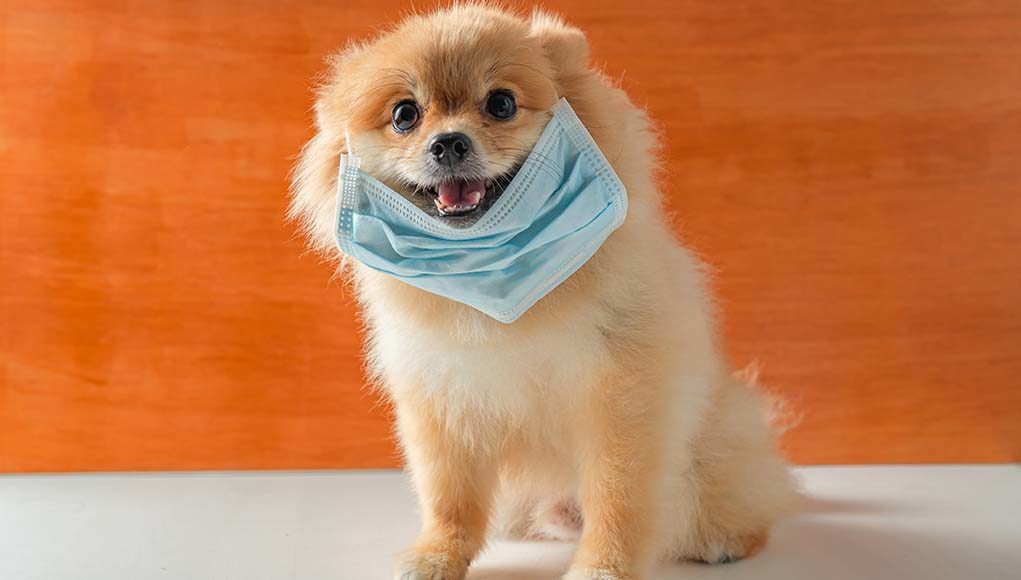As we continue fighting against human coronavirus (COVID-19), dog owners who pay close attention to their pet’s vaccinations are asking questions. “Isn’t coronavirus something my dog is vaccinated for?” The answer is yes – dogs are vaccinated against “their type” of coronavirus, but COVID-19 is not the same type of coronavirus as the canine coronavirus (CCoV).
Table of Contents
In the medical and veterinary field, all viruses are grouped into “families”. When we talk about Coronavirus, we are referring to a family of viruses called Coronaviridae (1).
The different viruses grouped in a single-family have certain features in common. The viruses in the Coronaviridae family all share a similar appearance – the viral particles have surface projections that look like solar corona under the electron microscope.
Within each viral family, there are subfamilies and genres. In the Coronaviridae virus family, there are two subfamilies: Orthocoronavirinae and Letovirinae (2).
The current human Coronavirus (COVID-19) is a member of the “Sarbecovirus” genre, a genre that falls into the Orthocoronavirinae subfamily.
What we refer to as canine coronavirus (CCoV) is actually two strains of Coronavirus (one that affects the dog's intestinal tract and the other affects the dog's respiratory tract) that fall into the “Alphacoronavirus” genre, which is also in the Orthocoronavirinae subfamily.
Different types of Coronavirus affect different animals (3).
While we don’t currently know enough about COVID-19 to know which animals it affects, we do know that it is a zoonotic virus, as it has been confirmed in March 2020 (4).
This means that COVID-19 can be passed from humans to animals and likely vice versa. The very first observed case of this was a tiger in the Bronx Zoo contracting COVID-19.
The canine coronavirus (CCoV), however, only affects dogs (5). That is, it is a species-specific virus. Species-specific viruses operate through very specific processes and interactions found in a particular species, which is why they cannot thrive in multiple species (6).
The Canine Coronavirus that is most often referenced is “Canine Coronavirus Type I”.
This type of coronavirus is referred to as “enteric coronavirus” (7). This virus strain attacks the dog's gastrointestinal tract where it replicates and causes cell death in the epithelial mucosa of the small intestines (8). The severity of Canine Coronavirus Type I depends on whether a dog is healthy, a dog’s age, and whether the virus has mutated.
CCoV has an incubation period of one to two days, and once symptoms begin, they include diarrhea, loss of appetite, and vomiting.
In healthy dogs, canine coronavirus treatment is targeted at symptom relief and replenishing fluids lost. In some instances, antibiotics may be necessary. Most dogs have little trouble overcoming symptoms, but in some dogs – particularly those with Parvovirus – CCoV can be fatal (9).
CCoV is exceptionally contagious and infected dogs can spread the disease for between six to nine days via their feces. Some dogs have been known to shed the virus for as long as six months (10, 11).
The virus can be killed with most household disinfectants, so cleaning up after your dog and disinfecting “potty patches” after your infected dog has used them is the best way to keep CCoV from spreading.
The Canine Coronavirus vaccine is part of your dog’s puppy shots, a type of multivalent vaccine (DHPP). It is included in the yearly or every two-years vaccination booster.
Canine Coronavirus Type II is a more recent strain of Canine Coronavirus and is also called Canine Respiratory Coronavirus or CRCoV (12).
This strain affects the dog's respiratory tract and is similar to the human cold virus and kennel cough. Infection with CRCoV can also cause infection with kennel cough (13).
CRCoV is exceptionally contagious and is spread through contact with dogs carrying the infection, contact with respiratory secretions, or contact with contaminated environments or objects. Dogs are most likely to contract CRCoV when they are housed in close quarters with other dogs, like when they are boarded in a boarding kennel.
Unlike CCoV, we do not know how long CRCoV incubates before symptoms show in the dog, and we do not know how long the virus is shed once contracted (14).
There is no current vaccination for CRCoV, and the CCoV vaccines are ineffective because CRCoV is not related to CCoV.
Treatment of CRCoV, like CCoV, is aimed at resolving symptoms and providing supportive care. Symptoms of CRCoV infection in dogs include sneezing, coughing, and nasal discharge. Some dogs have more severe symptoms than others and some have no symptoms at all but they can still spread the virus. Dogs with other respiratory conditions or co-existing illnesses are more likely to suffer severe infection or progression to pneumonia.
Canine coronavirus isn't very common, especially since most dogs will be vaccinated against it. However, if you are worried that your dog is showing signs of canine coronavirus, do not attempt to treat it by yourself – check in with your veterinarian as soon as possible.
While waiting for the appointment, isolate your dog from any other pets. Also, be sure to call your veterinarian ahead of time and do not come unannounced. If your dog has contracted either CCoV or CRCoV, they can wind up infecting every other dog in the vet’s office if you don’t warn your vet that you’re coming in ahead of time.
READ NEXT: 4 Facts About Coronavirus All Dog Owners Must Know













